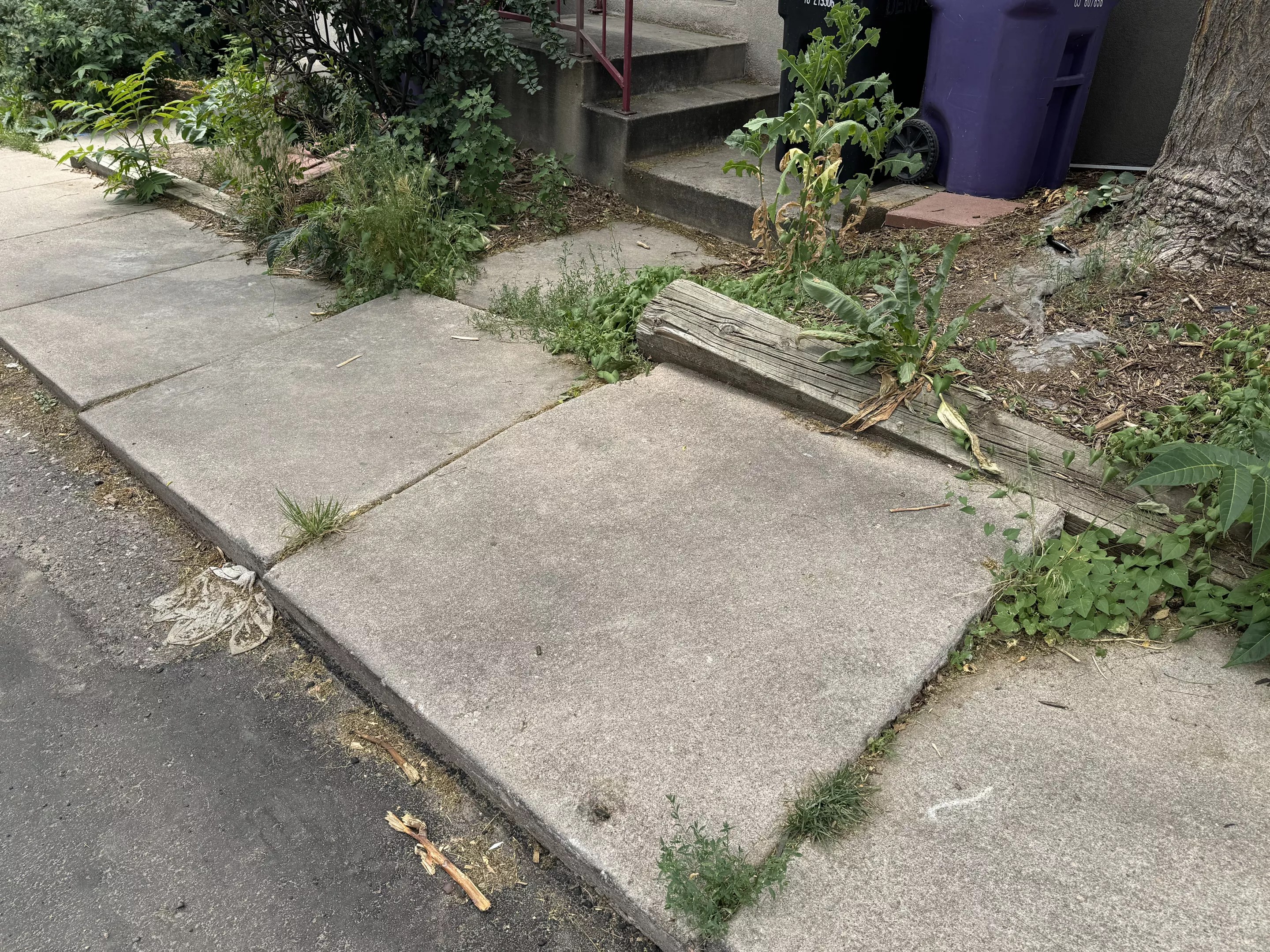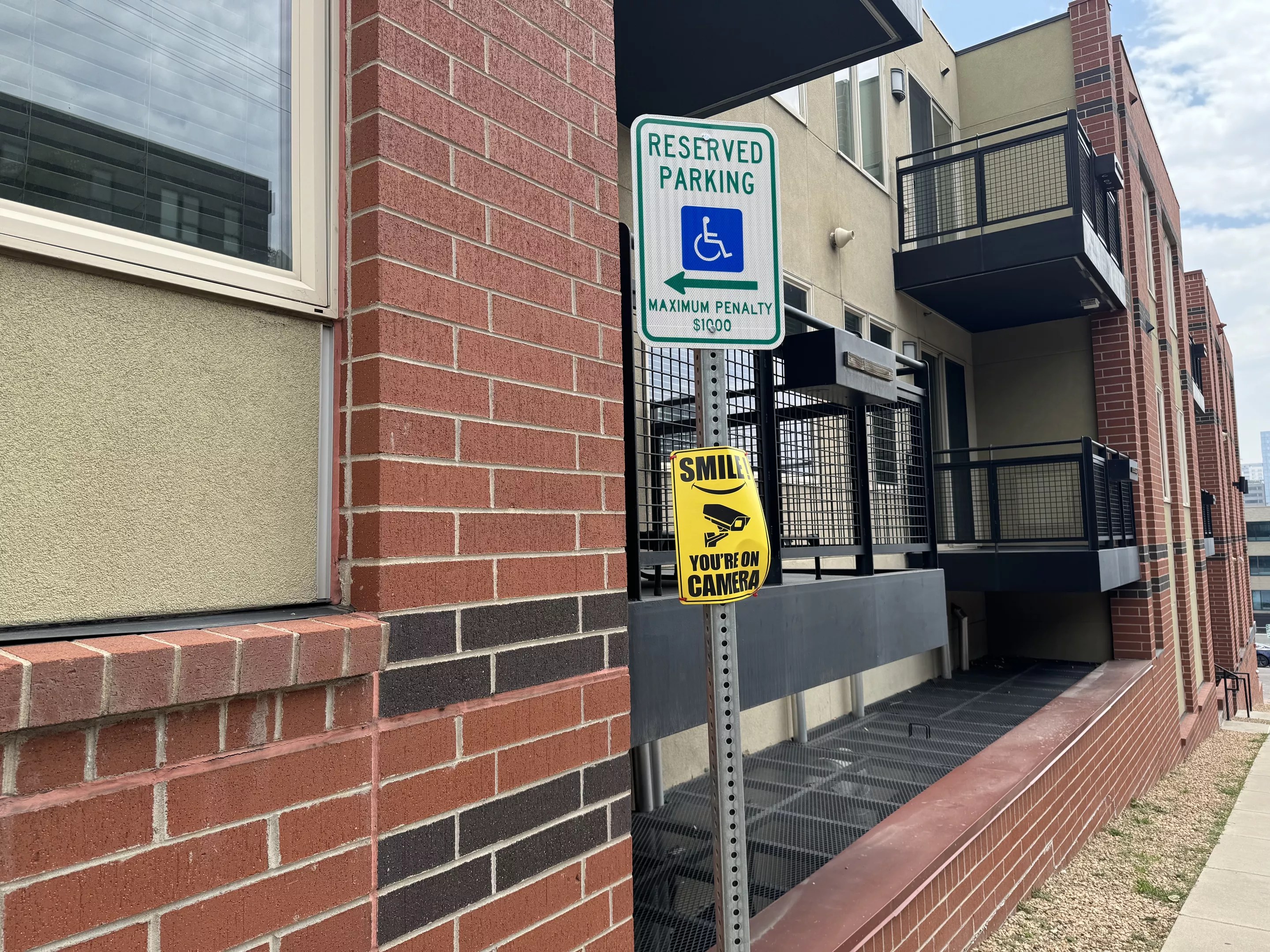
Catie Cheshire

Audio By Carbonatix
The sidewalk outside Ashlee Gentile’s home in the Highland neighborhood is busted by a tree.
Although the City of Denver is aware of “major damage” to the sidewalk, the area isn’t being prioritized for repairs in the first wave of work that will commence next month as part of the rollout of Denver’s long-awaited citywide sidewalk program.
In the past, Gentile has been unable to lift the front of her foot, a condition called drop foot that causes toes to drag while walking. She also has trouble with mobility due to a spinal condition called spondylolisthesis.
“I’m not a worst-case scenario,” says Gentile of her disability. “I’m at 80 percent recovery. I’m doing okay, but if somebody had a wheelchair on my street, I don’t think they could survive.”
Denver, make your New Year’s Resolution Count!
We’re $14,000 away from our End-of-Year campaign goal, with just a couple of days left! We’re ready to deliver — but we need the resources to do it right. If Westword matters to you, please contribute today to help us expand our current events coverage when it’s needed most.
When proponents successfully pushed for a 2022 ballot measure requiring the city to charge property owners a fee to create a citywide sidewalk program, accessibility for people with disabilities like Gentile was a big selling point of the program.
Because Denver’s sidewalks used to be the responsibility of individual property owners, the city’s sidewalk network is often disconnected, in states of disrepair or too small to comply with Americans with Disabilities Act requirements. Placing sidewalks under the city’s purview would help fix those problems more quickly, proponents argued.
“The idea behind the ordinance was that we all use sidewalks in our daily lives to access schools, businesses and parks, and to visit friends and neighbors. Having a safe and connected sidewalk network means everyone gets around with greater ease,” says Nancy Kuhn, communications director for the Denver Department of Transportation & Infrastructure. “We have 350 miles of missing sidewalks in Denver and many more miles of sidewalk that need repair or are too narrow.”
After a long process to finalize the amount each property would be charged, which raised concerns about inequity when the fee was originally based on the linear square foot of each property, the city landed on a solution and began collecting fees for the first time this January.
Approximately 95 percent of properties in Denver pay a $150 flat fee each year, but there are rebates for people who qualify for income-based assistance. The other 5 percent are properties over 230 linear feet, which are charged $150 plus an impact fee of $3.50 for each foot over 230. The amount is divided into two and charged twice per year on people’s stormwater bills.
Gentile, who has owned her townhome since 2023, says being charged the fee amidst a saga with the city in which she can’t get help with the inaccessible nature of her sidewalk was upsetting. The sidewalk in front of her home is in good condition, though narrow, while her next door neighbor has a tree with a root lifting the sidewalk from below, rupturing the sidewalk and creating an uneven surface by about four inches.
Making matters worse is the lack of off-street parking for the row of townhomes. The parking that is available is largely two-hour metered parking. Gentile applied for, and received, an accessible parking space from the city across the street from her townhome last summer. She says she was told the spot had to be placed across the street because the sidewalk in front of her home did not meet ADA requirements.
According to Kuhn, the space was placed across the street because there was not room for associated signage due to the small amount of space between the building and the sidewalk outside Gentile’s home. Plus, there is high demand for curb space in front of her building.

Though Ashlee Gentile was able to secure an accessible space, she still hopes the sidewalk can be repaired.
Catie Cheshire
When Gentile was told the reason the space couldn’t be on her side of the street due to accessibility problems, she reported the issue through the city’s online reporting portal in June 2024.
A month later, she tripped on the uneven sidewalk and sustained a gash on her knee that required months to heal. In October 2024, she had surgery for her spondylolisthesis and had to use a wheelchair for two months while recovering. She reported the sidewalk again at that time after receiving no response to her previous query. She also tried to report the issue to Denver’s Office of the City Forester because the problem is caused by a tree.
“It was a series of being turned around, redirected, cases closed. Not a lot of help,” Gentile says.
When she did hear back from forestry, she was told she could repair the sidewalk herself, but the impacted area is in front of a neighbor’s home, so she is not allowed to fix it herself. She says she and a neighbor offered to pay for repairs but were declined by the owner of the townhome where the sidewalk is broken.
Gentile tried to reach out through forestry again after receiving her bill in January for the sidewalk repair program, hoping that since the city was now taking charge she could get some help.
“I sent an email asking, ‘What is this? What is it for? What does it help?’ she says. “I have a sidewalk I’ve tripped over, I’ve hurt myself on. I’m ADA. Can you please take a look at it?”
At that point, the forestry department told her her sidewalk is actually within the private property line rather than the public right-of-way, so she shouldn’t have even been charged the sidewalk fee. However, she still couldn’t get the help she wanted – and that answer is not correct.
Every property owner pays the fee. In cases like Gentile’s where the sidewalk does not fall within the right of way, DOTI will have to acquire temporary construction easements or purchase the area. Kuhn says those areas are not eligible for the first round of repairs this year because of that complication, but will eventually be addressed. The city is unsure how many properties may have similar situations but is evaluating the extent of that issue now as DOTI develops a Sidewalk Implementation Plan.
Gentile’s issue also can’t be fixed in the first round of repairs because of the tree causing the problem.
“At present, we are not handling sidewalk damage caused by trees through the spot repair program as those are more complicated sidewalks to correct and often require full design and coordination with the City Forester, whereas spot repairs are intended as field fit improvements that do not require full design,” Kuhn says.
The city has hired a program management team to establish a plan for the sidewalk program and has $3.5 million to spend this year on repairs. DOTI is developing a work schedule now by examining damage reported to 311, reviewing the severity of those case and grouping the geographically. Repairs will begin in July and DOTI will publish the work plan online once it is ready.
Kuhn says DOTI already has plans to build new sidewalks on Sheridan Boulevard between West Colfax Avenue and 17th Avenue, on Tower Road between Pena Boulevard and 72nd Avenue and on West Evans Avenue between Patton Court and Osceola Street.
“One thing we continue to get the word out about is that our sidewalk repair program is not on-demand,” Kuhn says. “We realize some residents might be expecting on-demand repairs, but it’s not feasible from a time and cost perspective to require a contractor to continually mobilize and remobilize in an unorganized fashion across the city.”
With a case labeled as “major” by DOTI and acknowledged by the city, Gentile remains frustrated without a timeline for repairs.
“Everybody is aware, and I just feel like they keep disregarding me,” she says. “I absolutely wouldn’t mind paying for a service if it were given. …It is frustrating, because I don’t know what else to do.”
Gentile says she worked with her credit card company to have her payment of the fee refunded by filing a claim saying she had paid for a service that wasn’t rendered. However, she is considering selling her home because of the sidewalk issues.